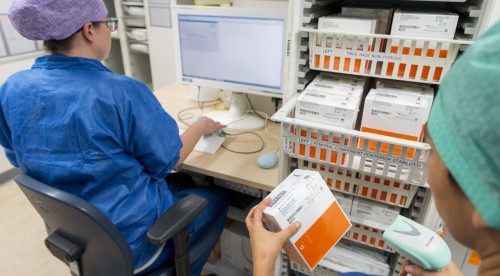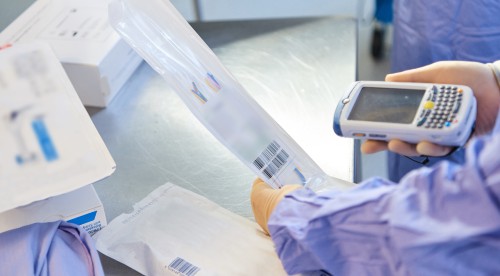December 21, 2023 Opinion piece
A reflection on some of the most significant milestones from GS1 standards and Scan4Safety for 2023.
Medical devices at the forefront
One of the major driving forces for standards adoption in recent years has been medical device regulations. 2023 was no different as the case for GS1 standards was further strengthened by the publication of the Department of Health and Social Care’s medical technology (medtech) strategy and by NHS England’s Outcomes and Registries Programme.
The ability to uniquely identify, track, and trace medical devices (particularly those classed as high risk) is integral to both the medtech strategy and NHS England’s Outcomes and Registries Programme. This not only helps to improve the availability of medical devices, it also enhances supply chain traceability so devices can be tracked to the patient in order to better monitor outcomes using the Medical Device Outcomes Registry (MDOR).

The good news is that results from a GS1 barcode survey conducted in Portsmouth earlier this year showed that more than 95 per cent of medical devices already use GS1 standards for unique device identification (UDI). This means that one of the key foundations required to underpin both initiatives is already in place.
However, to further adoption and implementation in support of these initiatives, supplier engagement is critical. With the launch of our new supplier adoption group, we aim to gain a deeper understanding of the current and future challenges facing our members in order to improve the support and resources we provide.
Patient safety at the heart
Many of the more recent national policies, strategies and programmes, have been borne out of the recommendations highlighted in Baroness Cumberlege’s 2020 Independent Medicines and Medical Devices Safety Review. These recommendations are further supported by those of the Healthcare Services Safety Investigation Body (HSSIB – formerly HSIB).
In July, during an investigation into the selection and insertion of vascular grafts in haemodialysis patients, the HSIB recommended “that NHS England reviews system requirements for barcode scanning technology, in order to support local organisations to reduce the risk of incorrect selection and insertion of prostheses/implants”.

The investigation’s report also acknowledged that “barcode scanning technology (Scan4Safety) can be used to mitigate the risk of an incorrect medical device being selected/inserted.
“Due to the reduced central management of the Scan4Safety programme, trusts have been developing applications and using adaptations of the scanning technology, resulting in inconsistent use and variable effectiveness.”
Not only have we seen an accelerated drive for improved product and device safety, there has also been notable emphasis on medication safety. This is particularly true of recent months where we have seen closed-loop medicines gain more traction centrally. The system of closed-loop medicines builds on the Scan4Safety principles of uniquely identifying every person, every product, and every place to improve the traceability and safety of medicines administration and dispensing.
Setting the foundations for change
The importance of unique device identification and Scan4Safety is now firmly recognised and supported as a key enabler to improving patient safety and outcomes.
To support the uptake of point-of-care scanning, NHS Supply Chain announced the deployment of in-trust inventory management systems (IMS) to 20 NHS trusts over a two-year period. Elcom Systems Ltd, Genesis Automation (UK) and Ingenica Solutions Ltd (all of which have a GS1 UK-Approved IMS), have been awarded contracts for implementation.
Evidence of Scan4Safety’s growing significance also exists in NHS England’s 2021 Digital Clinical Safety Strategy. Two years since the initial launch, NHS England have placed additional focus on supporting NHS trusts with Scan4Safety implementation. Responsibility for the programme has moved to the Medical Directorate team and is accompanied by the relaunch of the Scan4Safety website and the creation of a suite of supporting materials.
More recently, further validation has come in the form of NHS England’s Strategic Framework for NHS Commercial which was released in November.

The most significant recognition of all came from the UK government, which in June issued a mandate to NHS England stating that “all trusts across England should adopt barcode scanning of high-risk medical devices by March 2024”.
The 2024 deadline set by the mandate is a clear reflection of the vital role that barcode scanning can play in levelling up the NHS’s digital maturity and infrastructure.
A UK-wide approach to Scan4Safety
Momentum for Scan4Safety continues to grow and today its evolution spans far beyond the initial six demonstrator sites that were established in England in 2016. Now national programmes exist in both Scotland and Wales while Northern Ireland is focusing on GS1 standards implementation to improve asset management.
This year saw the first pilots go live in Scotland with NHS Lothian being the first site to embark on their Scan for Safety journey. Wales are also making great strides and have successfully conducted a centralised rollout of Omnicell’s IMS to each of the Welsh health boards.
Our continuing engagement
It goes without saying that our work would not be possible without the collaboration and support from both our members and our wider networks. The appointment of Steve Bush, medical director – operations at Leeds Teaching Hospitals NHS Trust to the GS1 UK supervisory board; and the recent appointment of Sara Ford, executive director of strategy, marketing and change at NHS Supply Chain, as chair of the healthcare advisory board will provide our organisation with unique insights and expertise that will shape our approach for years to come.

Throughout 2024 we will continue to raise awareness via events and webinars and will continue to amplify our visibility in government through our public policy engagement.
To round off 2023, I would like to extend a thank you to our GS1 UK partners, and to the suppliers, healthcare providers and central representatives working across the four nations.
I am sure I will not be alone is saying that I am looking forward to seeing the impact of GS1 standards and Scan4Safety broaden in the year ahead.
